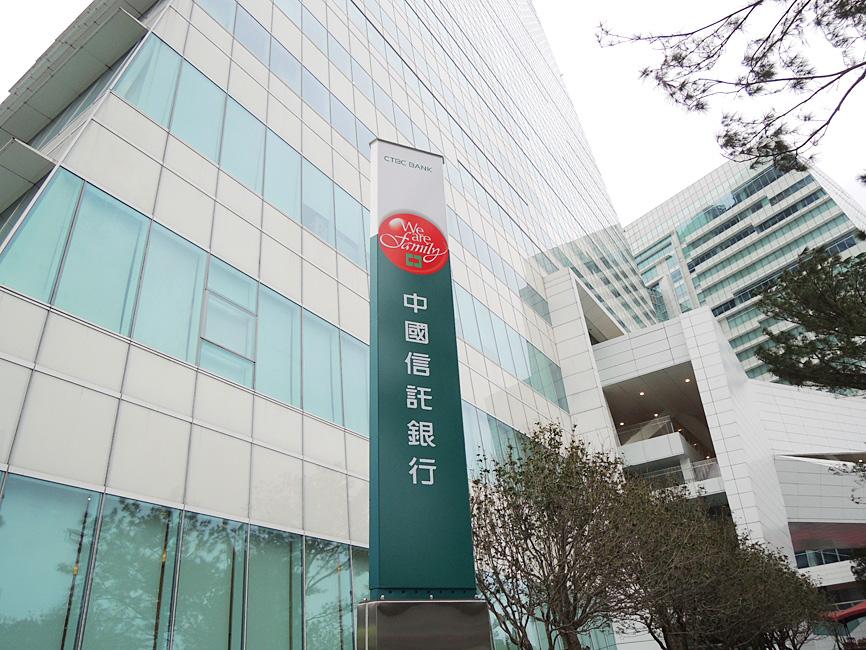CTBC Financial Holding Co (中信金控) earlier this week said that the Dow Jones Sustainability Indices (DJSI) have once again selected the company as a component of the DJSI World Index and have for the fifth consecutive year listed it on the DJSI Emerging Markets Index.
The company has shown outstanding performance in risk management, financial crime prevention, climate strategy, charity work and financial inclusion, as well as with regards to the environmental, social and corporate governance criteria, this year’s DJSI evaluation results said.
CTBC Financial said that it is an honor to be selected in the same year for the DJSI World Index and Emerging Market Index, after last being selected for both in 2017.

Photo: Lee Chin-hui, Taipei Times
In the face of the increasing risks of climate change and the effects of the COVID-19 pandemic, people worldwide are paying close attention to sustainability issues, CTBC Financial president Daniel Wu (吳一揆) said in a statement.
As one of the leading financial institutions in Asia, CTBC Financial hopes to become a model of corporate sustainability, Wu said.
In this regard, the company would continue to respond to stakeholders’ expectations and fulfill its corporate social responsibilities, while using the “Transformation and Transition” strategy to help solve social problems, promote low-carbon transformation and practice corporate sustainability, Wu said.
Launched in 1999 by Zurich, Switzerland-based sustainability ratings agency RobecoSAM Group and S&P Dow Jones Indices, the DJSI is not only one of the most internationally credible corporate sustainability evaluation tools, but also an important evaluation reference for global investors.
The components of the DJSI are selected from the Dow Jones Global Index, and thousands of companies are evaluated every year, based on their impact on the economy, environment and society.
The selection of companies reflects their strength in strategy, management and industrial characteristics, and only those that fall in the top 10 percent within their industry with regards to their sustainability performance can be selected for DJSI components, CTBC Financial said, adding that the competition is fierce.
In responding to the UN’s Sustainable Development Goals, CTBC Financial said that it has adopted a transparent governance policy and a responsible environmental attitude.
The firm also pays attention to employee care and provides satisfying products and services, it added.
CTBC Financial said that in March it established a corporate sustainability office, which reports directly to the company’s president and helps coordinate the sustainability-related strategies and practices of the holding company and its subsidiaries.
In June, it promoted the corporate sustainability committee to a functional committee under the board of directors, with independent directors serving as the conveners in a bid to highlight the importance of sustainability-related issues, the company said.
CTBC Financial said that it also participates in international initiatives.
The company in April joined the Task Force on Climate-related Financial Disclosures, and last month signed on to the Partnership for Carbon Accounting Financials, becoming Taiwan’s first financial institution to join the industry-led initiative.
Its subsidiary CTBC Bank (中國信託銀行) last year joined the Equator Principles to comply with the UN Principles for Responsible Banking.
Another subsidiary, Taiwan Life Insurance Co (台灣人壽), last year adopted the Principles for Responsible Investment (PRI) and Principles for Sustainable Insurance (PSI).
In July, the insurance unit released the first PRI report in the financial industry, and it plans to publish a PSI report by the end of this year, CTBC Financial said.

South Korea’s equity benchmark yesterday crossed a new milestone just a month after surpassing the once-unthinkable 5,000 mark as surging global memory demand powers the country’s biggest chipmakers. The KOSPI advanced as much as 2.6 percent to a record 6,123, with Samsung Electronics Co and SK Hynix Inc each gaining more than 2 percent. With the benchmark now up 45 percent this year, South Korea’s stock market capitalization has also moved past France’s, following last month’s overtaking of Germany’s. Long overlooked by foreign funds, despite being undervalued, South Korean stocks have now emerged as clear winners in the global market. The so-called “artificial intelligence

NEW IDENTITY: Known for its software, India has expanded into hardware, with its semiconductor industry growing from US$38bn in 2023 to US$45bn to US$50bn India on Saturday inaugurated its first semiconductor assembly and test facility, a milestone in the government’s push to reduce dependence on foreign chipmakers and stake a claim in a sector dominated by China. Indian Prime Minister Narendra Modi opened US firm Micron Technology Inc’s semiconductor assembly, test and packaging unit in his home state of Gujarat, hailing the “dawn of a new era” for India’s technology ambitions. “When young Indians look back in the future, they will see this decade as the turning point in our tech future,” Modi told the event, which was broadcast on his YouTube channel. The plant would convert

‘SEISMIC SHIFT’: The researcher forecast there would be about 1.1 billion mobile shipments this year, down from 1.26 billion the prior year and erasing years of gains The global smartphone market is expected to contract 12.9 percent this year due to the unprecedented memorychip shortage, marking “a crisis like no other,” researcher International Data Corp (IDC) said. The new forecast, a dramatic revision down from earlier estimates, gives the latest accounting of the ongoing memory crunch that is affecting every corner of the electronics industry. The demand for advanced memory to power artificial intelligence (AI) tasks has drained global supply until well into next year and jeopardizes the business model of many smartphone makers. IDC forecast about 1.1 billion mobile shipments this year, down from 1.26 billion the prior

People stand in a Pokemon store in Tokyo on Thursday. One of the world highest-grossing franchises is celebrated its 30th anniversary yesterday.